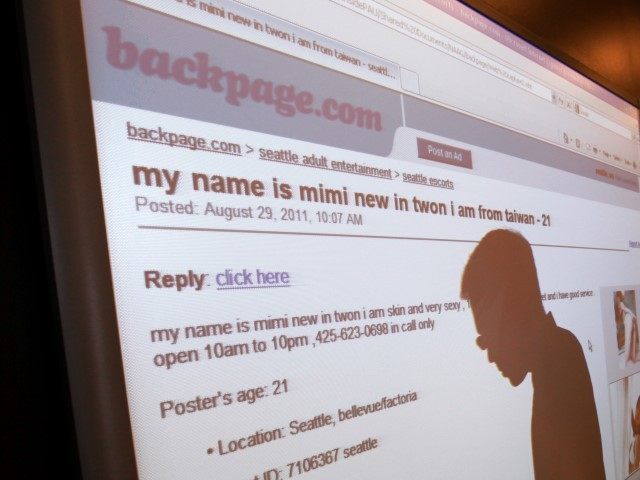Silicon Valley companies are “on edge,” as lawmakers attempt to hold them responsible for online sex trafficking on their platforms, according to The LA Times.
“After a sustained assault from lawmakers, investigators and victims groups, the website Backpage.com agreed early this year to shut down its lucrative adult page, which had become a well-known sex-trafficking hub,” reported the LA Times‘ Evan Halper on Thursday, before adding, “It wasn’t long before the company was back in the headlines.”
“The adult section was gone, but the sex traffic was not. In May, authorities in Stockton charged 23 people with involvement in a trafficking ring that was using another corner of Backpage to market sex with girls as young as 14. A Chicago teenager allegedly trafficked on Backpage had her throat slit in June,” he explained. “The resilience of this platform — host to an estimated 70% of online sex trafficking at its peak — is a long-running public relations mess for the tech industry. Internet freedom laws held sacred in Silicon Valley have helped shield Backpage from prosecution and lawsuits by victims of gruesome sex trafficking.”
“Now the tech industry’s Backpage problem has evolved into a full-blown political crisis. An unexpectedly large coalition of lawmakers is aiming to hold sites like Backpage liable for trafficking, sparking panic in Silicon Valley over the far-reaching consequences for the broader Internet,” Halper continued. “Almost every attorney general in the country wants the decency act changed to strip legal immunity for sites that condone or promote trafficking… Fifty of them wrote a letter to Congress a few weeks ago citing several horrific cases in which Backpage was used to traffic teenage girls. They warned the act has ‘resulted in companies like Backpage.com remaining outside the reach of state and local law enforcement in these kinds of cases.'”
Sen. Rob Portman (R-OH) claimed, “The Communications Decency Act is a well-intentioned law, but it was never intended to protect sex traffickers,” while California Attorney General Xavier Becerra added, “We would have been able to stop the abuse and in some cases the death of some of these young people who got caught up in these sex trafficking rings,” had the site been held responsible.
However, there has been significant opposition to the lawmakers, most notably from the Electronic Frontier Foundation, a popular digital rights advocacy organization who issued a warning to technology companies last month about censoring neo-Nazis, claiming the same tools would quickly be used against mainstream opinions.
“The Internet community as a whole objected strongly to the Communications Decency Act, and with EFF’s help, the anti-free speech provisions were struck down by the Supreme Court. But thankfully, CDA 230 remains and in the years since has far outshone the rest of the law,” the organization declared in a statement. “Section 230 says that ‘No provider or user of an interactive computer service shall be treated as the publisher or speaker of any information provided by another information content provider’. In other words, online intermediaries that host or republish speech are protected against a range of laws that might otherwise be used to hold them legally responsible for what others say and do.”
“The protected intermediaries include not only regular Internet Service Providers (ISPs), but also a range of ‘interactive computer service providers,’ including basically any online service that publishes third-party content,” they continued. “Though there are important exceptions for certain criminal and intellectual property-based claims, CDA 230 creates a broad protection that has allowed innovation and free speech online to flourish. This legal and policy framework has allowed for YouTube and Vimeo users to upload their own videos, Amazon and Yelp to offer countless user reviews, craigslist to host classified ads, and Facebook and Twitter to offer social networking to hundreds of millions of Internet users.”
“Given the sheer size of user-generated websites (for example, Facebook alone has more than 1 billion users, and YouTube users upload 100 hours of video every minute), it would be infeasible for online intermediaries to prevent objectionable content from cropping up on their site,” EFF explained. “Rather than face potential liability for their users’ actions, most would likely not host any user content at all or would need to protect themselves by being actively engaged in censoring what we say, what we see, and what we do online. In short, CDA 230 is perhaps the most influential law to protect the kind of innovation that has allowed the Internet to thrive since 1996.”
In an article last month, Wired noted that support for free speech was starting to dwindle in Silicon Valley, with an increase in CEOs of major technology companies starting to doubt the concept.
Charlie Nash is a reporter for Breitbart Tech. You can follow him on Twitter @MrNashington and Gab @Nash, or like his page at Facebook.

COMMENTS
Please let us know if you're having issues with commenting.